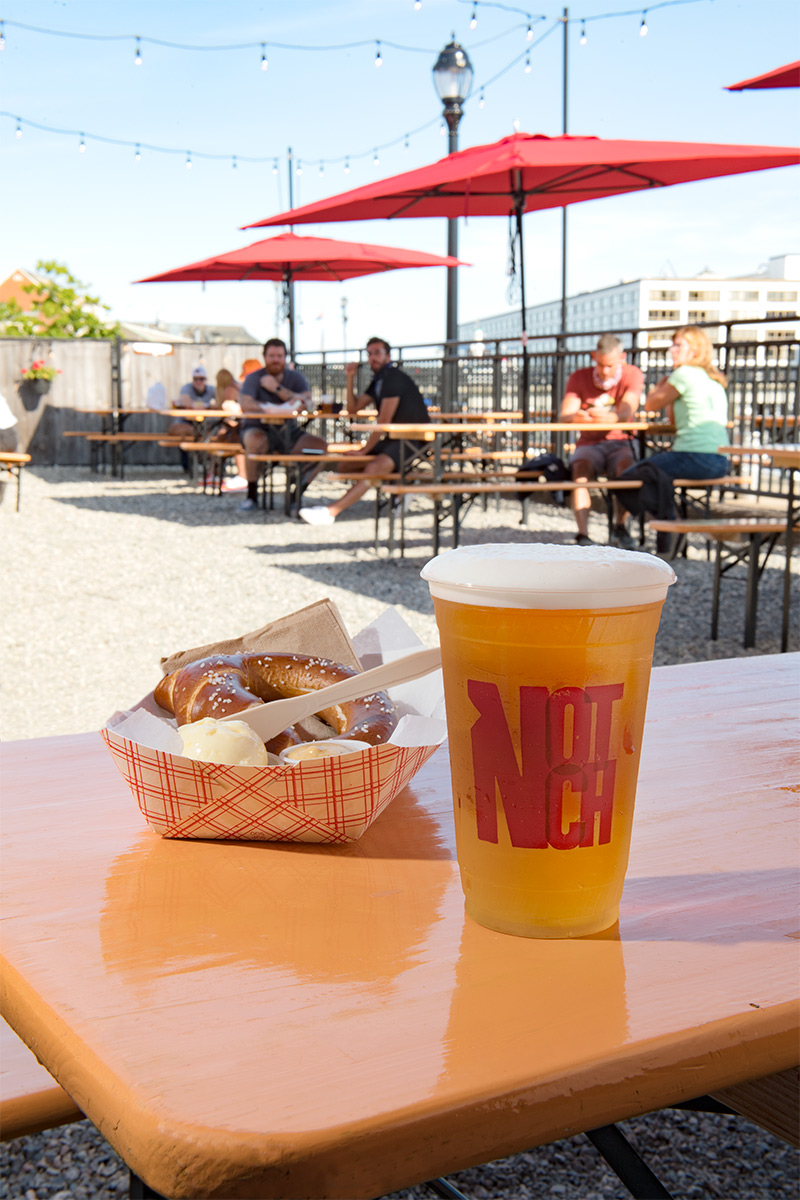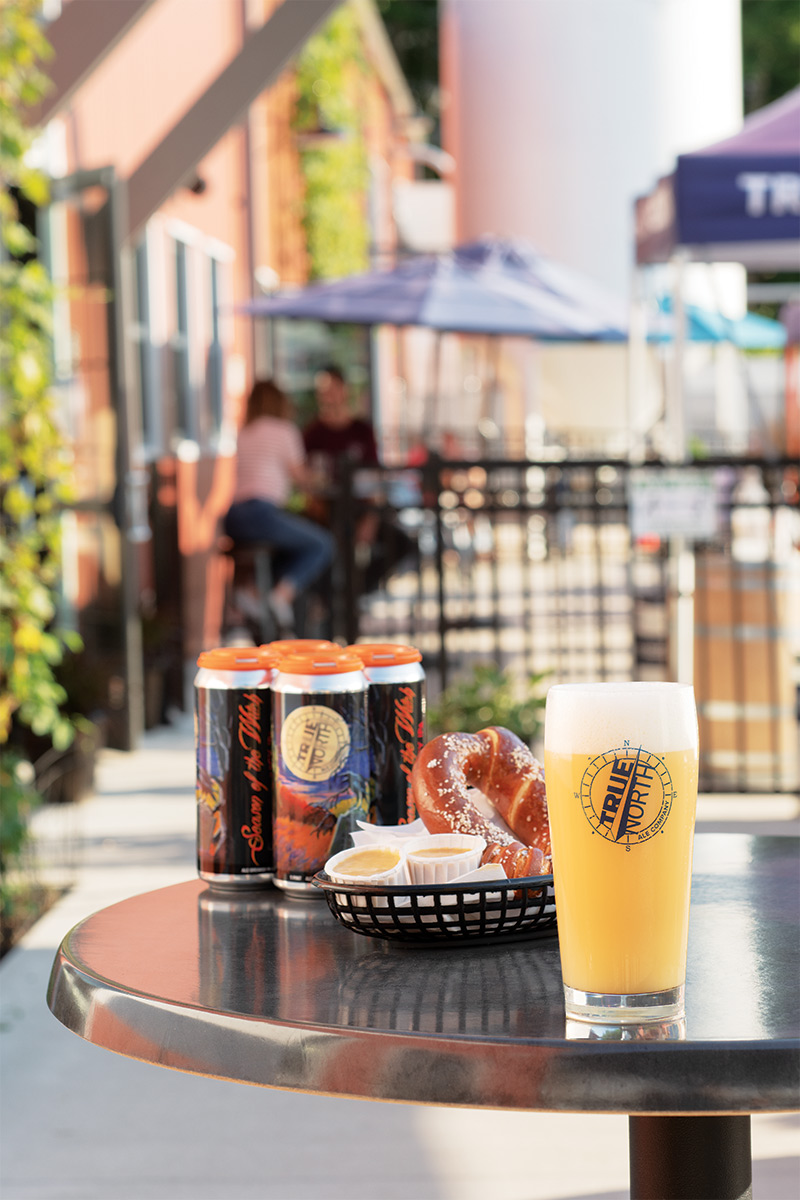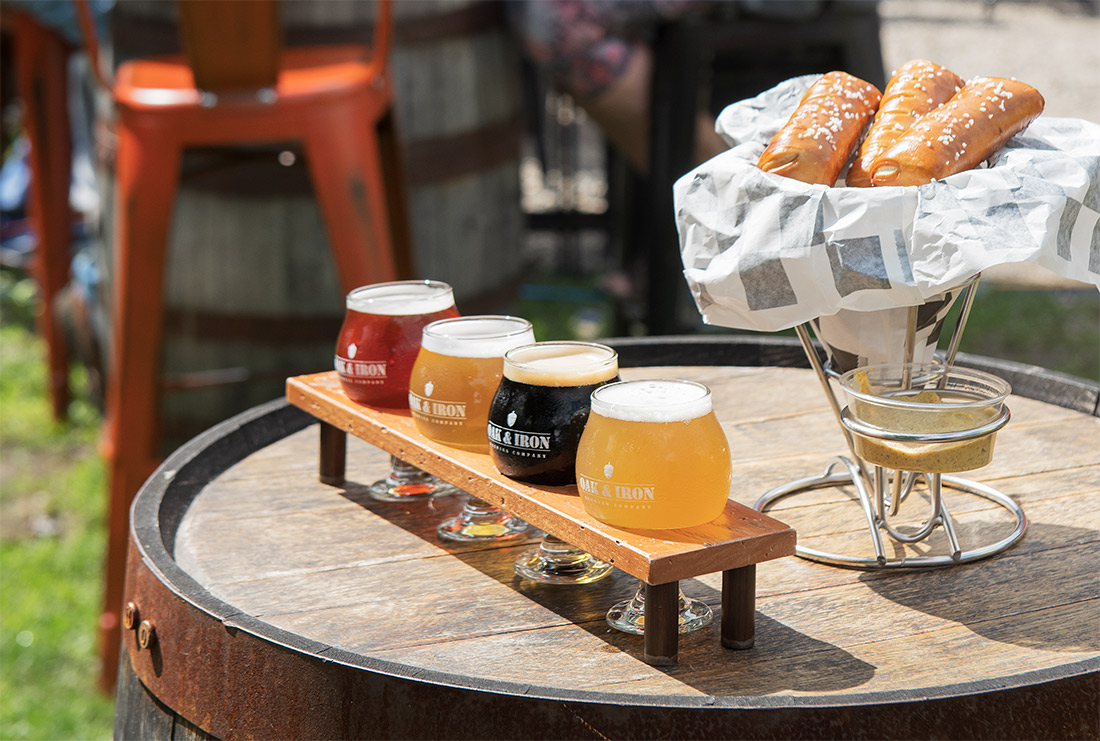If there’s one thing brewers on the North Shore can agree on during a pandemic, it’s this: Nothing goes better with a beer than a soft, warm pretzel.
But the region’s brewers actually happen to agree on more than just what bar snacks pair best with beer, especially now that the COVID-19 outbreak has them all caught in the same impossible circumstances. Back in March, breweries across Massachusetts shuttered for the good of public safety and their employees. Then, in April, Governor Charlie Baker signed a bill permitting bars, breweries, and restaurants to sell beer and wine via pick-up or delivery, provided that food was included as part of the order; in June, he allowed establishments to reopen for outdoor service but required that food be prepared on site. As government guidance has evolved, breweries have scrambled to keep up, to stay properly staffed, and to preserve the integrity of their service.
“We take the pandemic seriously,” says Liz Olive, tap room general manager at Salem’s Notch Brewing. “We want to keep our staff safe, and we also want to keep the public safe. So I’m between a rock and a hard place.”
The government, she says, has everybody’s best interests at heart, but their response to the ongoing crisis is imperfect all the same. Olive appreciates the conflict between wanting to do what’s right—following the guidance—and being frustrated by the difficulties and adjustments the guidance imposes. In this situation, doing what’s right means making a sacrifice. “There’s such a huge disconnect between service right now,” says Olive. “Notch has always really prided ourselves, not just on the product that we serve, but how we serve it, and customer interaction.”
Instead of drinking from proper glassware, customers drink out of plastic cups. They order food and beer on their phones, and not by speaking to the server, because there isn’t a server taking orders at all. “Even the customer and employee interactions, where we have a chance to chat you up and figure out what you like or what you don’t like and help you figure out what to order, that’s all gone.”

Losing that dynamic is tough on breweries, which are essentially community meeting houses for the towns they call home. But things aren’t all bleak. Olive notes that 95 percent of customer interactions remain positive, with the remaining 5 percent comprising people who take issue with wearing masks or other COVID-19 mandates.
Encounters like that are few and far between, not only for Notch, but also for Ipswich’s True North Ale Company and Andover’s Oak & Iron Brewing Company. “We were concerned about that at first,” says Gary Rogers, True North’s founder and chief of business operations. The Tuesday after the most recent law went into effect, Rogers explains, “We did have someone who came up, and we told them what the new rule was, and they said, ‘Well, the heck with that,’ and they left.” And that was that. Rogers can’t recall an interaction like that one since.
On the other hand, Jim Cass, Oak & Iron’s co-founder and head brewer, can’t recall a single interaction like that. “This has not been an issue at all with our customers, which I must admit, it’s a bit of a surprise to me,” Cass admits. He credits that to the brewery’s decision to, as he puts it, “pre-communicate” the new ordinances and the effect they would have on brewery operations to their patrons. A notice was immediately posted to Oak & Iron’s website, they sent notifications out across their various social media feeds, and they put a sign outside of the brewery, as well as at tables, letting people know what to expect and how to conduct themselves. “When everybody comes here, we always tell them what the rules are,” says Cass. “You wear a mask, table service, and then the last thing we always say is that because of the new state law effective August 11, everybody must purchase food along with their first beer.”
If the client interaction side of running a brewery during the pandemic has been more or less smooth, the actual logistics of adhering to the state’s guidelines have been a bit more challenging. Providing food service at a brewery, where food service isn’t unheard of but also isn’t the primary purpose, becomes more difficult when it’s a requirement.
“Since every customer, or at least every group, has to order something to share or get something individually, the volume is two, three times the amount of food we were doing before, in a time where we are trying to keep costs to a minimum,” Olive says. Labor costs have gone up since the passing of the new law, a reality compounded by the size of Notch’s kitchen and the need to keep their staff safe.
Unsurprisingly, Rogers and Cass share stories similar to Olive’s. “When it’s mandated that you can’t have a drink unless you’re going to also have food, then that means that we have to have additional staff,” Rogers also notes. More people are needed to prepare soft pretzels from Eastern Standard Provisions and gourmet mustards from Wicked Twisted Pretzels.
Cass agrees that “operations and staffing have been a huge challenge for us. If you think about it, we’d normally run our food service sometimes with one person on a Thursday, and Saturday we’d probably have two people running our food service. Now we’ve doubled our food service.” Worse, Olive, Rogers, and Cass had only a week to make the necessary changes on their end, as the updated standards for opening brewery doors were communicated on August 7—less than a week before they went into effect.
Keeping a brewery running under these conditions sounds nearly impossible, with the latest guidance feeling like one hurdle too many. But Notch, True North, and Oak & Iron are making it work. “We have an official slogan, basically for 2020, at Notch,” Olive says, “and it’s called ‘We’re doing the best we can.’”

Neither Rogers nor Cass has a new slogan of their own, but they’re following the Notch philosophy simply by staying the course and adapting to new laws as they’re announced. Nobody blames the government; they’re each keeping politics out of their policy as much as they can. The heart of beer culture isn’t about grievance; it’s about community.
“People come there, first of all, to sit down and to relax and to spend some time with family and friends,” Rogers says. The biggest difference between now and pre-COVID-19 is that before, people could engage with folks at other tables, catch up with friends or make new ones—though perhaps they can still do so from the proper distance. If the way they normally enjoy these breweries has changed, at least the spirit hasn’t.
And then there’s the food, which for Olive, Rogers, and Cass still comes down to the classic combination of pretzels and beer. “If you want the true Notch experience, it would be to come in and get the standard, which is our Czech Pils, then a German soft pretzel,” Olive says.
For Oak & Iron, Cass says, “Our top sellers include our charcuterie board, spinich dip, and Bavarian pretzels,” which go well with every single beer they have on tap.
Rogers has a specific recommendation in mind for anyone unafraid of big, roasty stouts, which is True North’s contribution to the Black Is Beautiful initiative—a cause taken up by over a dozen Massachusetts breweries that is intended to raise funds toward eradicating systemic racism.
True North’s variation on this beer is brewed with Tahitian vanilla beans and cocoa nibs, and that bittersweet flavor profile contrasts nicely with the saltiness of, once again, a warm, soft pretzel.
Not everyone will feel comfortable visiting breweries in person, of course, regardless of what’s on tap or what’s on the menu. But Notch, True North, and Oak & Iron each demonstrate that running a brewery is possible during COVID-19, no matter how much legislation is written that impacts the way they function. “Hanging in for the long haul is what we plan on doing,” says Olive, adding that “we’re going to hold out, and then just be as safe as we can.”

